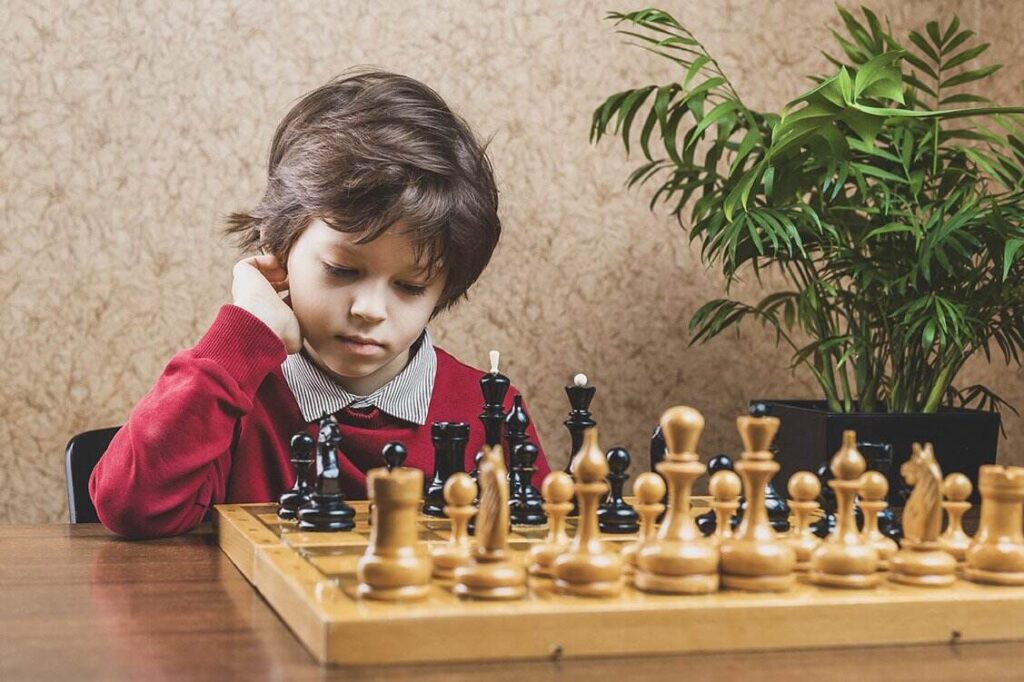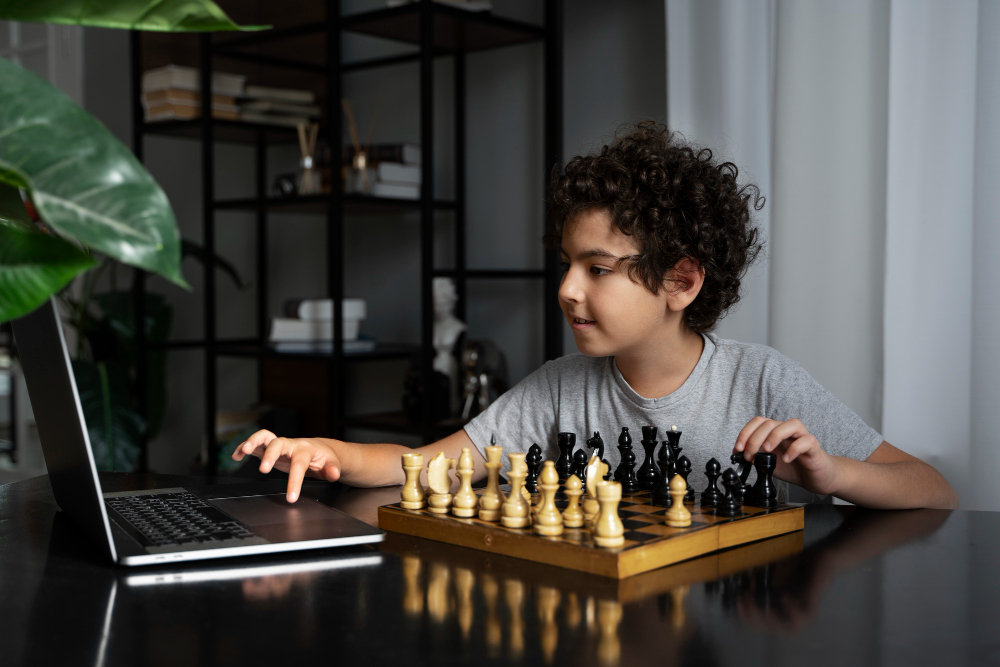As parents, we’re always looking for ways to help our children develop critical skills that will set them up for success, both academically and personally. One powerful tool for brain growth that is often overlooked is chess. While many people view chess as simply a game, it offers deep, lasting benefits for a child’s brain development. Chess sharpens memory, strengthens critical thinking, and builds focus, all while being an engaging and enjoyable activity.
Why Chess is Good for Brain Development
Chess is more than just a pastime—it’s a mental workout. When kids play chess, they engage both sides of their brain, stimulating logical thinking, creativity, and problem-solving skills.
What makes chess so unique is that it requires players to think ahead, make calculated decisions, and adapt their strategies in response to new challenges.
Activating Both Hemispheres of the Brain
One of the reasons chess is so effective at promoting brain growth is because it activates both hemispheres of the brain. The left hemisphere, which is responsible for logic and analysis, is engaged when players evaluate potential moves, assess risks, and think about the best course of action.
At the same time, the right hemisphere, which handles creativity and pattern recognition, is put to work when players visualize different positions on the board and come up with innovative strategies.
This balance between logical thinking and creativity is what makes chess such a powerful tool for brain development. By encouraging the brain to work in harmony, chess helps children develop both their analytical and creative thinking abilities.
Boosting Memory and Concentration
Chess is an excellent exercise for improving memory and concentration. During a game, players must remember their previous moves, consider their opponent’s past moves, and think ahead to future possibilities.
This constant engagement with the board trains children to focus for extended periods and improves their ability to hold and process information in their working memory.
For children, who are still developing these cognitive skills, chess can play a significant role in enhancing both short-term and long-term memory.
The more they play, the better they become at remembering strategies, anticipating their opponent’s next move, and recalling previous games to avoid repeating mistakes. This improved memory not only helps with chess but can also enhance their performance in school, especially in subjects like math and reading.
Chess and Problem-Solving: Sharpening Critical Thinking Skills
One of the most exciting benefits of chess is its ability to improve problem-solving skills. Every game of chess presents a series of problems that require thoughtful analysis and a strategic solution.
This is particularly beneficial for children because problem-solving is a crucial skill in both academic settings and everyday life.
Breaking Down Complex Problems
Chess teaches children how to break down complex problems into smaller, manageable parts.
Whether it’s developing a strategy to control the center of the board or figuring out how to defend against an opponent’s attack, players must consider all their options, analyze the risks and rewards, and choose the best course of action.
This systematic approach to problem-solving is incredibly valuable for children, especially when it comes to tackling challenging school assignments or navigating social situations.
For example, when faced with a tough math problem, children who play chess often approach the situation with greater confidence and logic. They’ve learned to think through their decisions and evaluate different solutions carefully.
This habit of analytical thinking, developed through chess, can help children become better problem-solvers in any context.
Developing Patience and Strategic Thinking
Another important aspect of chess is that it requires patience and strategic thinking. Chess games are not won in a single move; instead, success comes from carefully planning several moves ahead.
Children must learn to be patient, think long-term, and resist the temptation to make impulsive decisions. They realize that rushing through their moves can lead to mistakes that could cost them the game.
This lesson in patience is extremely valuable, especially in today’s fast-paced world where children are constantly seeking instant gratification. Chess teaches them the importance of delayed gratification, where the best results often come from waiting, thinking, and planning.
Over time, this helps children develop the mental discipline needed to approach challenges thoughtfully and strategically, rather than rushing through tasks just to get them done.
Adapting to New Situations
In every chess game, players must adapt to their opponent’s strategy. They might start with a plan in mind, but as the game progresses, their opponent’s moves force them to rethink and adjust.
This ability to adapt and think flexibly is a core component of critical thinking.
For children, learning to adapt their strategy in chess teaches them how to handle unexpected challenges in life.
Whether it’s dealing with a surprise twist in a classroom project or managing a conflict with a friend, chess helps children develop the cognitive flexibility to respond to new situations with confidence and creativity.
The more they play, the better they become at thinking on their feet and adjusting their plans as needed.
Chess Builds Focus and Attention Span

In today’s world, distractions are everywhere—from smartphones to video games to constant notifications. Many parents struggle with helping their children focus for extended periods, especially when it comes to schoolwork.
Chess is an excellent tool for building focus and attention span, two key skills that are crucial for academic success and personal growth.
Training the Brain to Focus
When playing chess, children must concentrate on the board for long stretches of time. Each move requires deep thought, and players can’t afford to lose focus, as even a single careless mistake can change the outcome of the game.
This need for sustained concentration helps children learn how to focus their attention for longer periods. Over time, their ability to concentrate strengthens, making it easier for them to stay engaged in tasks that require mental effort, such as completing homework or studying for exams.
This ability to maintain focus can also carry over into other areas of life, such as reading or learning a new skill.
For children who have difficulty staying on task or get easily distracted, chess provides a structured, rewarding way to improve their focus without feeling like they’re doing “work.” Instead, they’re enjoying the challenge of the game, and focus becomes a natural part of the process.
Managing Distractions
Beyond training children to focus, chess also teaches them how to manage distractions. Whether they’re playing in a bustling classroom, at home, or in a chess tournament, children must learn to tune out distractions and zero in on the game.
This skill of blocking out external noise and staying focused on a task is valuable for school settings, especially during tests or assignments where concentration is key.
For example, children who have practiced focusing through chess will find it easier to concentrate during timed classroom activities, exams, or other situations where staying mentally sharp is critical.
The more they play chess, the better they become at managing their attention, even in distracting environments.
Enhancing Executive Function
Chess also strengthens executive function, which refers to the set of mental skills that help with organizing, planning, and achieving goals. Children who play chess regularly learn to think strategically, plan their moves, and organize their thoughts effectively.
They understand that every move must be part of a larger strategy and that even small decisions can have long-term consequences.
This understanding helps children develop better organizational skills in their academic and personal lives.
Whether it’s keeping track of assignments, managing their time, or planning for long-term projects, the skills learned from chess help children become more organized and efficient in their daily tasks.
Chess encourages them to think ahead and make thoughtful decisions, skills that are essential for success both in and out of the classroom.
Chess Encourages Emotional Resilience
Beyond developing cognitive abilities, chess also fosters emotional resilience, teaching children how to handle both victories and defeats gracefully.
While it’s easy to celebrate wins, learning to cope with losses—and using them as opportunities for growth—is one of the most valuable lessons chess can offer.
Learning from Mistakes
In chess, mistakes are inevitable. Even professional players lose games and make errors. However, the real value lies in analyzing mistakes after a match.
Chess encourages children to reflect on their moves, understand what went wrong, and figure out how to avoid similar mistakes in the future. This process builds a mindset of learning and improvement rather than one focused solely on winning or losing.
For children, this attitude can be applied to other areas of life. Whether they struggle with a school subject, face a challenge in sports, or have a disagreement with a friend, chess teaches them to reflect, learn, and improve instead of getting discouraged.
The game reinforces the idea that making mistakes is part of the learning process and that perseverance leads to growth.

Building Patience and Emotional Control
Chess requires a great deal of patience. Games can take time, and rushing through decisions often leads to mistakes. Children quickly learn that thinking carefully before making a move leads to better outcomes.
This practice of delaying decisions, considering options, and waiting for the right moment teaches children impulse control and helps them develop emotional regulation.
This lesson extends beyond the chessboard. Children who play chess regularly tend to have better control over their emotions.
They learn not to react impulsively to stressful situations, whether it’s in school or in personal relationships. Instead, they pause, assess, and make thoughtful choices—skills that are critical for emotional intelligence and long-term success.
Handling Wins and Losses
Chess also teaches children how to handle both winning and losing with grace. In life, there will always be moments of success and failure, and chess provides a safe space for children to experience both.
Winning can boost their confidence, but more importantly, losing teaches them humility, resilience, and the understanding that setbacks are temporary.
Children learn that losing a game of chess doesn’t mean they’re bad at the game—it simply means there’s room to grow.
This understanding encourages them to view challenges as opportunities for improvement rather than as failures. In this way, chess builds emotional resilience, which is essential for facing life’s ups and downs with a positive, growth-oriented mindset.
Chess Strengthens Logical and Critical Thinking Skills

One of the core benefits of chess is its ability to build logical and critical thinking skills. At its heart, chess is a game of logic. Every move must be carefully considered, and every action has a reaction.
Players need to evaluate the consequences of each move and plan several steps ahead. These mental exercises help children develop sharp reasoning skills, which are essential for academic success and decision-making in everyday life.
Developing Cause and Effect Thinking
In chess, every action has a consequence. Moving a piece might open up an attack, but it could also leave other pieces vulnerable.
Chess teaches children to think through their actions and anticipate the potential outcomes before making a move.
This type of cause-and-effect thinking is crucial not only in chess but also in school subjects like science, where children must think through experiments and predict results, or in history, where they need to understand how one event can lead to another.
As children improve in chess, they become better at predicting outcomes and making decisions based on careful analysis. This ability to foresee the results of their actions helps them become more thoughtful and strategic in other areas of life as well.
Encouraging Multi-Step Planning
Chess isn’t just about thinking one move ahead. To be successful, players must develop a long-term strategy, considering multiple possibilities and adapting to the evolving game.
This kind of multi-step thinking requires children to plan ahead and constantly evaluate their position on the board. Chess forces players to analyze situations in real time, think several steps forward, and adjust their strategy as needed.
This skill of multi-step planning translates into everyday situations, such as setting goals or managing tasks. Children who learn to think several steps ahead in chess often become more organized and capable of managing complex tasks in school or at home.
Whether it’s breaking down a large project into smaller tasks or figuring out how to balance homework with extracurricular activities, chess helps children develop the foresight and planning skills they need for long-term success.
Analyzing Patterns and Strategic Thinking
One of the most critical aspects of chess is pattern recognition. As children play more games, they begin to recognize certain setups, tactics, and strategies that consistently lead to success.
For example, they might notice that controlling the center of the board tends to give them more options, or that certain opening moves often lead to stronger mid-game positions.
Recognizing these patterns allows players to make decisions more quickly and strategically.
The ability to see patterns is not only important in chess, but also in academic subjects like math, where recognizing patterns can help children solve problems faster, or in writing, where recognizing narrative structures can help them understand stories more deeply.
Chess Enhances Academic Performance

Chess not only stimulates brain development but also has a direct positive impact on a child’s academic performance. Many studies have shown that children who play chess tend to perform better in school, particularly in subjects like math, reading, and problem-solving.
This is largely because chess strengthens the cognitive abilities that are essential for academic success—such as critical thinking, concentration, and creativity.
Improving Math Skills
Chess and math share several similarities. Both require logical thinking, pattern recognition, and the ability to calculate multiple variables at once.
Chess players must constantly think ahead, consider different possibilities, and calculate the potential outcomes of each move. This is very similar to solving math problems, where children must use logic to find solutions and sometimes approach problems from different angles.
As children get better at chess, they become more comfortable with mental calculation and problem-solving. They learn to quickly assess situations, make decisions based on logic, and apply the strategies they’ve learned to new situations.
All of these skills are critical for math, making chess a great way to enhance a child’s mathematical abilities.
Boosting Reading Comprehension
While chess is primarily a game of strategy, it also helps improve reading comprehension. Chess requires players to analyze situations, think critically, and make informed decisions based on available information.
These are the same skills that are needed for reading comprehension—especially when it comes to understanding complex texts, drawing inferences, and analyzing the motivations of characters.
For example, just as a chess player must anticipate an opponent’s next move, a reader must anticipate what might happen next in a story.
By developing the ability to think ahead and analyze different possibilities, chess players become better at understanding and interpreting written texts. The more they play chess, the sharper their analytical thinking becomes, which translates into improved reading comprehension.
Developing Discipline and Focus for Studying
Chess teaches children the importance of discipline and focus, which are crucial for academic success. As we’ve discussed, chess requires players to concentrate deeply and think strategically about their moves.
This focus doesn’t just help in chess—it also helps children stay engaged and focused when they are studying or working on school projects.
The discipline learned through chess extends to other areas of a child’s life, especially schoolwork. Chess players often develop the habit of approaching challenges systematically.
Whether it’s preparing for a test or completing a difficult homework assignment, children who play chess are more likely to stick with a task until it’s finished, even if it’s challenging. Chess instills a mindset of persistence, which is vital for academic achievement.
Enhancing Creativity in Writing and Expression
While chess is often associated with logic and strategy, it also nurtures creativity. Each game of chess presents new situations, and players must often come up with innovative strategies or unexpected moves to outsmart their opponent.
This creative thinking translates well into writing and other forms of self-expression.
When children learn to think creatively in chess, they begin to apply that same thinking to writing. They become more comfortable experimenting with new ideas, exploring different narratives, and taking unique approaches to storytelling.
This kind of creative problem-solving encourages children to express themselves more freely and think outside the box in both their writing and other creative pursuits.
Chess Builds Social Skills and Confidence
While chess is typically seen as a solo game, it also fosters social skills and builds self-confidence in children. Through chess, children interact with peers, learn sportsmanship, and experience healthy competition, all of which contribute to their social and emotional development.
Learning Sportsmanship
Chess teaches children the importance of respect—for their opponent, for the game, and for the outcome, whether they win or lose. It’s not just about winning; it’s about learning from the experience.
Children are taught to shake hands before and after each game, regardless of the result, which instills a sense of sportsmanship. They learn to handle both victory and defeat gracefully, which is an important life skill.
This lesson can help children navigate other competitive environments, such as school sports or academic challenges, with a positive attitude.

Building Friendships and Social Connections
Chess also provides opportunities for children to make friends and connect with others who share the same interest. Whether in a school chess club, a local tournament, or online platforms, children can meet and interact with peers from different backgrounds.
These social interactions not only build friendships but also teach valuable communication skills, as players often discuss strategies, share tips, and even review their games together.
Boosting Confidence
Winning a chess game, especially after a well-executed strategy, can give children a sense of achievement that boosts their confidence. Chess shows children that success comes from effort and thoughtfulness.
Even when they lose, the game teaches them that learning from mistakes is a path to improvement. Over time, this combination of effort, reflection, and progress helps children develop self-confidence—not just in chess, but in other areas of their life.
Chess as a Lifelong Skill
Lastly, one of the most rewarding aspects of chess is that it’s a lifelong skill. The benefits of playing chess don’t disappear as a child grows older; in fact, many of the skills learned in chess continue to be valuable throughout adulthood.
Chess can be played at any age, making it a great hobby that fosters continued learning, mental stimulation, and personal growth over the years.
A Game for All Ages
Because chess is accessible to players of all ages, it can be a family activity as well. Parents can play with their children, and even grandparents can join in on the fun.
This intergenerational aspect of chess makes it unique, as it brings people of all ages together through a shared, timeless game. Plus, playing chess as a family creates a bond while also reinforcing the many benefits we’ve discussed, such as improved critical thinking, memory, and focus.
Wrapping it up
Chess is a powerful tool for promoting brain growth in children, enhancing critical thinking, problem-solving, memory, focus, and even emotional resilience.
It offers both cognitive and social benefits, helping kids excel in school and build essential life skills like patience, discipline, and confidence. By introducing your child to chess, you’re not only giving them a fun and challenging game but also setting them up for long-term success, both academically and personally.
At Global School of Chess, we’re committed to helping children unlock their full potential through the game of chess. Ready to help your child grow? Visit Global School of Chess to explore our programs and start their journey today!
READ NEXT:

